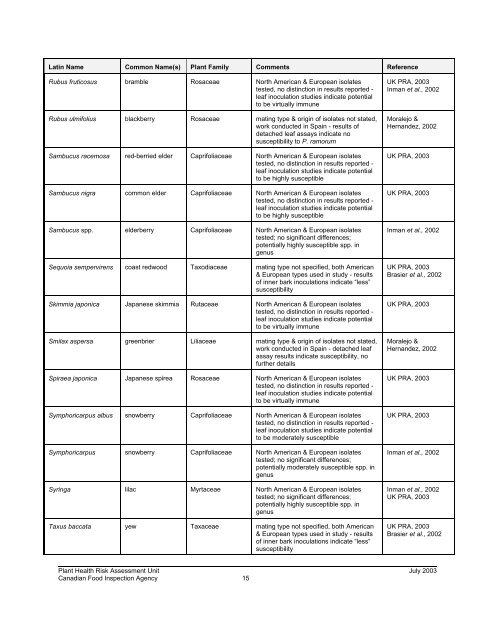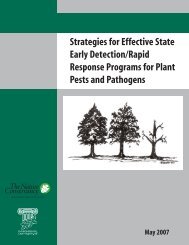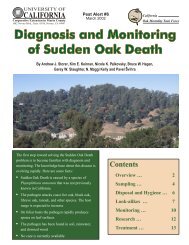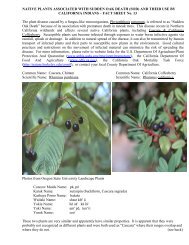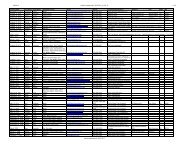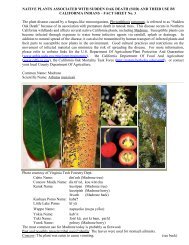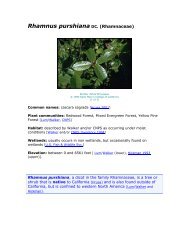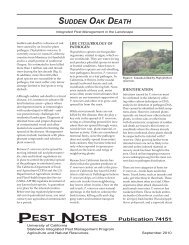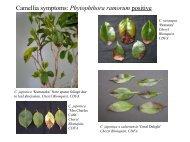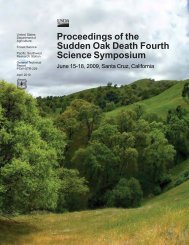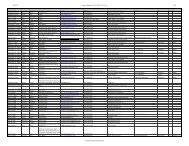Hosts of Phytophthora ramorum, CFIA, July, 2003 - Sudden Oak Death
Hosts of Phytophthora ramorum, CFIA, July, 2003 - Sudden Oak Death
Hosts of Phytophthora ramorum, CFIA, July, 2003 - Sudden Oak Death
Create successful ePaper yourself
Turn your PDF publications into a flip-book with our unique Google optimized e-Paper software.
Latin Name Common Name(s) Plant Family Comments Reference<br />
Rubus fruticosus bramble Rosaceae North American & European isolates<br />
tested, no distinction in results reported -<br />
leaf inoculation studies indicate potential<br />
to be virtually immune<br />
Rubus ulmifolius blackberry Rosaceae mating type & origin <strong>of</strong> isolates not stated,<br />
work conducted in Spain - results <strong>of</strong><br />
detached leaf assays indicate no<br />
susceptibility to P. <strong>ramorum</strong><br />
Sambucus racemosa red-berried elder Caprifoliaceae North American & European isolates<br />
tested, no distinction in results reported -<br />
leaf inoculation studies indicate potential<br />
to be highly susceptible<br />
Sambucus nigra common elder Caprifoliaceae North American & European isolates<br />
tested, no distinction in results reported -<br />
leaf inoculation studies indicate potential<br />
to be highly susceptible<br />
Sambucus spp. elderberry Caprifoliaceae North American & European isolates<br />
tested; no significant differences;<br />
potentially highly susceptible spp. in<br />
genus<br />
Sequoia sempervirens coast redwood Taxodiaceae mating type not specified, both American<br />
& European types used in study - results<br />
<strong>of</strong> inner bark inoculations indicate “less”<br />
susceptibility<br />
Skimmia japonica Japanese skimmia Rutaceae North American & European isolates<br />
tested, no distinction in results reported -<br />
leaf inoculation studies indicate potential<br />
to be virtually immune<br />
Smilax aspersa greenbrier Liliaceae mating type & origin <strong>of</strong> isolates not stated,<br />
work conducted in Spain - detached leaf<br />
assay results indicate susceptibility, no<br />
further details<br />
Spiraea japonica Japanese spirea Rosaceae North American & European isolates<br />
tested, no distinction in results reported -<br />
leaf inoculation studies indicate potential<br />
to be virtually immune<br />
Symphoricarpus albus snowberry Caprifoliaceae North American & European isolates<br />
tested, no distinction in results reported -<br />
leaf inoculation studies indicate potential<br />
to be moderately susceptible<br />
Symphoricarpus snowberry Caprifoliaceae North American & European isolates<br />
tested; no significant differences;<br />
potentially moderately susceptible spp. in<br />
genus<br />
Syringa lilac Myrtaceae North American & European isolates<br />
tested; no significant differences;<br />
potentially highly susceptible spp. in<br />
genus<br />
Taxus baccata yew Taxaceae mating type not specified, both American<br />
& European types used in study - results<br />
<strong>of</strong> inner bark inoculations indicate “less”<br />
susceptibility<br />
UK PRA, <strong>2003</strong><br />
Inman et al., 2002<br />
Moralejo &<br />
Hernandez, 2002<br />
UK PRA, <strong>2003</strong><br />
UK PRA, <strong>2003</strong><br />
Inman et al., 2002<br />
UK PRA, <strong>2003</strong><br />
Brasier et al., 2002<br />
UK PRA, <strong>2003</strong><br />
Moralejo &<br />
Hernandez, 2002<br />
UK PRA, <strong>2003</strong><br />
UK PRA, <strong>2003</strong><br />
Inman et al., 2002<br />
Inman et al., 2002<br />
UK PRA, <strong>2003</strong><br />
UK PRA, <strong>2003</strong><br />
Brasier et al., 2002<br />
Plant Health Risk Assessment Unit <strong>July</strong> <strong>2003</strong><br />
Canadian Food Inspection Agency 15


